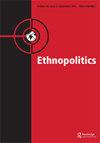Mobilization in the Shadow of Probabilistic Military Assistance: A Commentary on Anastasia Shesterinina’s Mobilizing in Uncertainity
IF 1.2
Q3 ETHNIC STUDIES
引用次数: 0
Abstract
In Mobilizing in Uncertainty (2021), Anastasia Shesterinina curates a set of memories shared by Abkhaz community members. Respondents explain why they were willing to take such great risks in 1992 in their own words. The result is a locally-valid historical reconstruction leaning heavily on Abkhaz oral histories. It is provocative, beautifully crafted, destined to be translated into both Russian and Abkhaz, and brings something mar-velous to the fi eld. The case is a potent reminder that, sometimes, a month of focused political violence can freeze a map for decades. Because Abkhazia is such a dif fi cult place to access, most accounts of the ideological battles of the early 1990s are informed by materials found in libraries and by interviews conducted in Tbilisi. Meanwhile, however, life has gone on in a rump Abkhaz state. De-facto independence has been a social reality for 30 years. Shesterininina ’ s research design captures and ampli fi es the worldview of her core subjects: self-de fi ned Abkhaz patriots, currently living in Abkhazia. Her respondents remember a war of national liberation. She chose to live for a long time among residents of this unrecognized political organism. She asked a lot of her subjects. She earned their trust gradually. She makes it clear that Mobilization in Uncertainty stands on many shoulders: veterans that shared oral histories, countless deceased elementary school teachers and librarians who organized letter-writing campaigns in Soviet times, and more than one special archive that no other researcher will access. An Abkhaz nation is rei fi ed with survivalist traits in Shesterinina ’ s text: adaptive, creative, and stubborn.概率军事援助阴影下的动员——评阿纳斯塔西娅·谢斯蒂尼娜的《不确定中的动员》
在《在不确定性中动员》(2021)中,阿纳斯塔西亚·谢斯特里尼娜策划了阿布哈兹社区成员分享的一组记忆。受访者用自己的话解释了他们为什么愿意在1992年承担如此大的风险。其结果是在很大程度上依靠阿布哈兹口述历史进行了当地有效的历史重建。它具有挑衅性,制作精美,注定要被翻译成俄语和阿布哈兹语,并将一些破坏性的东西带到了现场。这起案件有力地提醒我们,有时,一个月的集中政治暴力可能会使地图冻结几十年。由于阿布哈兹是一个很难进入的地方,大多数关于20世纪90年代初意识形态斗争的报道都是通过图书馆里的材料和在第比利斯进行的采访获得的。然而,与此同时,一个残余的阿布哈兹国家的生活仍在继续。事实上的独立已经成为30年来的社会现实。Shesterininina的研究设计捕捉并扩大了她的核心主题的世界观:自封的阿布哈兹爱国者,目前居住在阿布哈兹。她的受访者记得一场民族解放战争。她选择长期生活在这个未被承认的政治组织的居民中。她问了很多问题。她逐渐赢得了他们的信任。她明确表示,“不确定性动员”站在许多人的肩上:分享口述历史的退伍军人,无数在苏联时代组织写信运动的已故小学教师和图书馆员,以及其他研究人员无法访问的不止一个特殊档案。在Shesterinina的文本中,阿布哈兹民族具有生存主义特征:适应性、创造性和顽固性。
本文章由计算机程序翻译,如有差异,请以英文原文为准。
求助全文
约1分钟内获得全文
求助全文

 求助内容:
求助内容: 应助结果提醒方式:
应助结果提醒方式:


